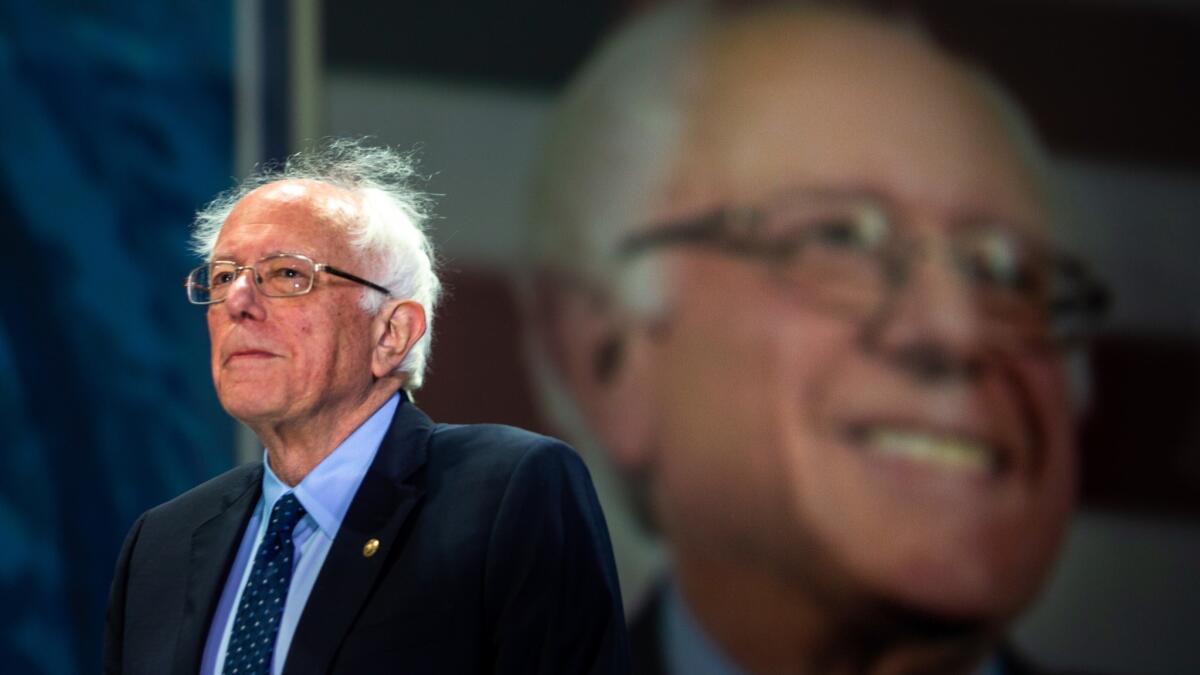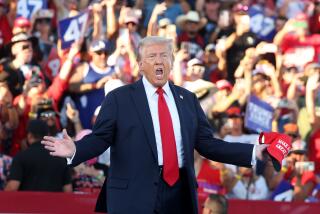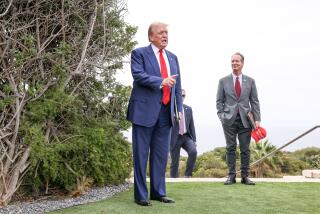14 Democratic presidential candidates give California its Cinderella moment

Reporting from San Francisco — This weekend, for just about 48 Cinderella hours, California was transformed.
The state has long been an afterthought in picking the nation’s presidents, watching nose-to-the-glass as others with a fraction of the population — Iowa, New Hampshire, next-door Nevada — get smothered with attention.
All that changed as the spring convention of California Democrats drew 14 White House hopefuls to this charming and clamorous city at the entrance of the Golden Gate.
Blink and you could have been in Des Moines, or Concord, N.H.
Only weirder.
Candidates trawled the conference rooms and hotel suites where delegates gathered, made breakfast appearances and hung out at late-night parties, seeking the support of women, environmentalists, gay and lesbian activists, union members.
It was, to California’s great distinction, the largest single gathering of 2020 presidential candidates to date.
The White House hopefuls speechified, shook hands, hugged, smiled for selfies and signaled to neglected California Democrats — simply by being here — that they and their home state matter very much.
Even if it doesn’t often feel that way.
California Democratic Party elects new chair to lead an organization pushing further left »
For Regina Q. Banks, attending her first state party gathering, the rare burst of attention was wonderful and wonderfully validating.
“They’re here. They came to see me,” said Banks, 40, who works for a faith-based group in south Sacramento County. “California is a state that matters all of a sudden because of the way we moved our primary. They all realize I vote here in California and now we can be in the vanguard of the blue wave, as opposed to just the ATM.”
(For decades, the extraction of cash from California has been a major ongoing political industry.)
Though Banks is leaning toward Kamala Harris, the home-state U.S. senator, she added winkingly, “I can be wooed.”
As part of its perennial effort to gain relevance, California has moved up its 2020 presidential primary, again. This time the date is March 3, which places it squarely after the four earliest-voting states: Iowa, New Hampshire, Nevada and South Carolina.
Never mind that 13 other states, as well as Democrats living abroad, will cast their ballots on the same day, or that delegates will be awarded in a way — apportioned among candidates rather than given as a lump sum to the winner — that will lessen California’s impact and dilute its import.
California being California, the state is simply too populous, its donors too deep-pocketed, its natural beauty too alluring for the candidates not to appear — especially with dozens of national political reporters on hand. (Many would doubtless have passed on a weekend in, say, Omaha.)
The gathering of 5,000 devout party loyalists and their guests was also a matchless opportunity to start building the cogs that power a political campaign — “the people that are willing to get on the phone… passing out fliers, doing voter registration,” said Ed Emerson, a longtime Democratic strategist from Sacramento. “To find those people at your core, this is where you find them.”
They’re here. They came to see me.
— Democratic convention delegate Regina Q. Banks
As polite guests, the candidates graciously acknowledged their host.
There was plenty of congratulation for California’s walloping performance in the 2018 midterm election, when Democrats nabbed seven seats to help seize control of the House.
A handful delivered more specifically tailored remarks.
Former San Antonio Mayor Julián Castro addressed the state’s housing affordability crisis. Pete Buttigieg, the mayor of South Bend, Ind., noted his recent Los Angeles appearance in support of the city’s Proposition EE, the parcel tax on Tuesday’s ballot that would boost school funding.
Apart from that, there was little to distinguish the speeches from those the candidates might have delivered in Sioux City, Iowa, or Keene, N.H.
No mention of the controversial Delta Tunnel water project, the problem-plagued bullet train, Disneyland’s opening of Star Wars: Galaxy’s Edge.
(A demonstration inside the George R. Moscone Center by professional sex workers in leather and fishnet stockings and a protest outside by anti-circumcision activists in fake-bloody trousers did, however, remind passersby this was indeed San Francisco.)
No matter.
The chance simply to see candidates up close in the flesh, as it were, was a revelation for California activists more accustomed to glimpses on television or via the internet.
“The vibe is different when you meet somebody,” said Darlene Elliot, 52, a policy analyst from Riverside.
She paid close attention to how the candidates kept their poise as they were peppered with questions while roaming the convention hall — an insight into their character she feels she cannot get from watching on TV.
“For me, it’s really about a person coming from empathy and understanding, but also being very grounded in who they are,” said Elliot, who was also leaning toward Harris but remains open-minded toward others.
On Sunday, the last three of the presidential hopefuls spoke, addressing a crowd considerably thinner than the turnout for Saturday’s 11-candidate parade.
Bernie Sanders, who maintains strong residual support from his 2016 run, was enthusiastically greeted as he swiped at former Vice President Joe Biden, the front-runner, who skipped the convention.
The path to victory in 2020, Sanders said, does not include finding middle ground, as Biden suggested, on issues like climate change and immigration.
After dazzling debut, Kamala Harris falls from top of presidential pack »
For a second day, delegates displayed their strong leftward tilt by booing one of the more moderate contestants, former Maryland Rep. John Delaney, when he declared Medicare for all — a proposal to expand the availability of healthcare — bad policy and bad politics.
Shouting to be heard over the din, Delaney told them, “This is a battle of ideas, my friends.”
It was similar to the contempt that greeted former Colorado Gov. John Hickenlooper on Saturday and had the same effect: Two candidates in the middle taking on the left — in San Francisco no less — and drawing notice they otherwise would never have gotten.
Will California continue to attract this much attention?
“It’s June of 2019,” said Gale Kaufman, who has spent decades managing California Democratic campaigns. “There’s a first impression everyone wants to make, but right now that’s all. Is it a one-day little schmooze or part of an ongoing engagement? We won’t know that for a while.”
Subscribe to the Los Angeles Times 2020 election calendar feed »
Shortly after noon Sunday — after the last die-hard delegates had left the convention hall, the microphones were stilled and the floor was littered with stepped-on signs — California had already begun its transformation back to political pumpkin.
Buttigieg planned to stick around Monday, traveling to Fresno to meet voters and hold a town hall on MSNBC. Biden is expected to return soon to shake the money tree.
But the fading focus was unmistakable.
Soon, 17 Democratic presidential contestants plan to be in Cedar Rapids, Iowa, for the state Democratic Party’s annual Hall of Fame dinner.
That’s three more than California managed.
More to Read
Get the L.A. Times Politics newsletter
Deeply reported insights into legislation, politics and policy from Sacramento, Washington and beyond. In your inbox three times per week.
You may occasionally receive promotional content from the Los Angeles Times.












